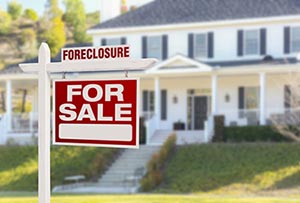The two main consumer bankruptcy options can help prevent the foreclosure of your home. Filing a Chapter 7 case can help a little, but maybe enough. Chapter 13 can provide a great deal of help.
Through Chapter 7
If you are in a situation where you want to keep your home and your mortgage lender has already scheduled the date of your foreclosure sale, most likely Chapter 7 will not help you enough. Talk with your attorney to find out if you have an unusual situation, but generally if it’s gone this far you need more than what Chapter 7 “straight bankruptcy” can provide.
Filing a Chapter 7 case WILL stop an immediate foreclosure. But that’s only the beginning. Then you need to find a way to satisfy your mortgage lender so that it will not just re-start the foreclosure as soon as your three-to-four-month-long bankruptcy case is completed. Or maybe even earlier-your lender could even get permission from the bankruptcy court to re-start the foreclosure process while your bankruptcy case is still open. And if you are facing a foreclosure, that inevitably means that you are many months behind on your mortgage, and so many thousands or even tens of thousands of dollars behind. Unless you have a way of coming up with that much money within a few months of filing your bankruptcy, most likely Chapter 7 is not going to help you enough once a foreclosure sale has already been filed.
So Chapter 7 is more likely going to help enough if you’re a little behind on payments but the foreclose sale had not yet been scheduled. The vague rule of thumb is that your mortgage holder will let you keep your home if you start up your regular monthly mortgage payment right away, and make extra monthly payments large enough to catch up on your mortgage within about a year. But how much time you will actually be given to catch up depends your lender and your individual circumstances.
So the key question for you is whether filing the Chapter 7 case will save you enough money on a monthly basis through discharging (writing off)of other debts so that you will have enough to pay both your regular mortgage payment and the extra amount needed to pay all your arrearage in time.
There is another potential benefit that may help in saving your home in a Chapter 7 bankruptcy. Chapter 7 may provide you with sufficient time to stop the sale of your home and to apply for a home loan modification. If your home loan modification is approved then the lender may put any past due arrears in the back of your home loans.
Through Chapter 13
If you won’t have enough money available each month to pay both the regular mortgage payment and the catch-up payment, you will need the extra benefits of a Chapter 13 “adjustment of debts” to keep your home.
Chapter 13 provides you a group of tools that can help you save your home permanently:
· Instead of just being stuck with your mortgage lender’s discretion about how much time you will have to catch up on your mortgage arrearage, Chapter 13 gives you as much as 5 years, with a payment program that you propose based on your budget.
· You can generally pay the mortgage and arrearage payments ahead of most or all of your other debts. Slash your other debts so that you can afford your mortgage payments.
· “Strip” your second (or third) mortgage off your home’s title, IF your home is not worth as much as the balance on your first mortgage.
· In your Chapter 13 plan, you can often favor other home-related debts that you need to pay and most likely would prefer to pay, which have liens on your home-taxes and child support, and home repair/renovation obligations, and back utility payments. Being able to pay these while under bankruptcy protection protects your home from these special creditors.
· Be able to sell your home without the pressure of a foreclosure sale, either a few months later or maybe even three or four years later when moving better fits your family’s schedule.
· If you fell behind on your property taxes, you can also catch up gradually, while preventing a tax foreclosure and also not allowing your mortgage lender to use being behind on your property tax debts as its justification for itself foreclosing.
· After your Chapter 13 case is filed and in process, your creditors are prevented from attaching liens to your house (as to any debts that existed at the time the case was filed). This includes federal and state income tax liens, child and spousal support liens, and judgment liens.
· If you have any judgment liens on your home, prevent them from foreclosing on your home.
· Better yet, you can “void” most judgment liens, and then discharge the related debts so you owe nothing. And the creditor can’t impose another judgment lien.
Conclusion
So we are left with these key questions:
· Will Chapter 7 improve your monthly cash flow enough so that you can catch up on your mortgage fast enough to satisfy your lender?
· Do you need the Chapter 13 advantages for your home so that its extra time and expense are worthwhile?
· Does even Chapter 13, with all of its advantages, still not make enough differences for your circumstances?
· Are there other alternatives worth considering, either instead of or in conjunction with bankruptcy?
We can discuss your situation with you, explore your options, and come up with the best game plan for you to save your home.

